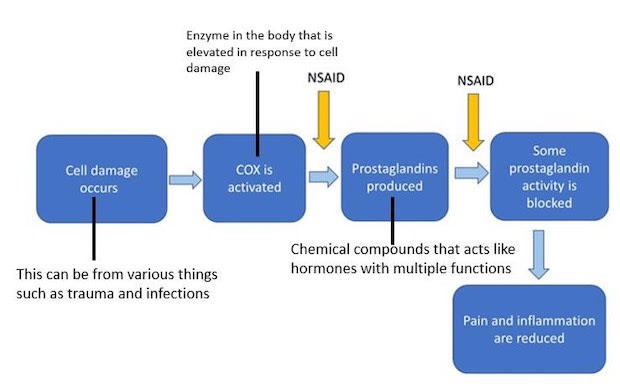Table of Contents
I. Anti-Inflammatories: A Quick Overview
II. Anti-Inflammatories You Can Take with Eliquis
V. Anti-Inflammatory Foods, Herbs, and Spices
You’ve recently started taking Eliquis, and you need to take pain medication. One of your first questions is likely: Which anti-inflammatory can I take with Eliquis?
It’s a smart question to ask. Anti-inflammatories are one of the most common types of drugs people take to treat common aches, pains, and inflammation. But they’re also known for their high levels of interaction with other drugs.
Knowing how different anti-inflammatories interact with Eliquis and other prescription drugs you’re taking is critical for avoiding unpleasant and often dangerous side effects.
In this article, we’ll break down the types of anti-inflammatories you’ll find on the shelf and tell you which ones you can safely take with Eliquis.
Quick Takeaways
- NSAIDs are the most common type of anti-inflammatory medication, but they’re not safe to take with Eliquis due to the risk of excessive bleeding.
- Acetaminophen is not an anti-inflammatory but is a safe alternative to NSAIDs to reduce non-inflammation-related pain and fever.
- Topical NSAIDs can be safe to take with Eliquis because they have natural systemic absorption, but it’s important to confirm with your physician first.
- Incorporating natural anti-inflammatories into your diet, like fruits, veggies, Omega-3 fatty acids, and certain herbs and spices can reduce ongoing inflammation symptoms.
- Healthy lifestyle choices like getting enough sleep, exercising, and maintaining the right diet can reduce the risk of inflammation flare-ups.
Anti-inflammatories: A Quick Overview
When people refer to anti-inflammatory medications, they’re usually talking about non-steroidal anti-inflammatory drugs—better known as NSAIDs. NSAIDs are extremely common in both over-the-counter and prescription forms. They account for 5-10% of all prescribed medicines each year and are used by 96% of patients 65 years and older. [1]
NSAIDs work by inhibiting the production of prostaglandins, which are chemicals in the body that promote inflammation, pain, and fever. When cell damage occurs (in the form of illness or injury), the cyclooxygenase (COX) enzyme is activated, causing prostaglandins to be reduced.
When NSAIDs block prostaglandin production, pain and inflammation symptoms are reduced.

Common types of NSAIDs you might recognize include ibuprofen (Advil, Motrin), naproxen (Aleve, Naprosyn), aspirin (Bayer, Ecotrin), and celecoxib (Celebrex).
People taking blood thinners are strongly advised to avoid NSAIDs because they inhibit platelet function and create a risk of excessive bleeding when taken together with anticoagulant medications like Eliquis.
So what can you take instead? Let’s explore some safer alternatives to NSAIDs.
What Anti-Inflammatories Can You Take with Eliquis? Safe Options
Acetaminophen
Acetaminophen (Tylenol) is not an anti-inflammatory, but it’s first on our list because it’s a safe alternative for many of the same issues NSAIDs are used to treat, like common aches and fevers.
Both medications inhibit the COX enzyme, but acetaminophen does so primarily in the central nervous system. As such, it doesn’t come with the same bleeding risk that NSAIDs do, minimizing the risk of blood clots and bleeding in places like the kidneys and GI tract.
This makes acetaminophen a safer option for Eliquis takers who need pain relief not related to inflammation.
Topical NSAIDs
Topical NSAIDs, such as diclofenac gel or cream, are applied directly to the skin over the affected area. They have minimal systemic absorption, reducing the risk of interactions with Eliquis and making them safer to use alongside blood thinners. Still, it’s important to talk to your doctor before you use any form of NSAIDs to confirm the safety of the specific medications you choose.
Anti-Inflammatory Foods, Herbs, and Spices
Rather than taking medication (either over-the-counter or prescribed), many people who are taking Eliquis choose to use natural remedies and diet changes to combat inflammation. Natural alternatives often have lower side effects than medications, can be more affordable, and have longer-lasting impacts.
Some examples include:
- Fruits and Vegetables: Fruits and veggies have natural anti-inflammatory properties. Some known specifically for their anti-inflammatory benefits are berries, leafy greens, pineapple, cherries, and broccoli.
- Omega-3 Fatty Acids: Fish oil supplements or consuming fatty fish (ex: salmon, mackerel) are sources of omega-3 fatty acids, which have anti-inflammatory properties.
- Turmeric: Turmeric contains curcumin, which has anti-inflammatory properties. High doses of curcumin may interact with anticoagulants, so moderation is key.
- Ginger: Ginger is commonly used in teas or as a spice in cooking and has natural anti-inflammatory effects but should also be used in moderation.
- Green Tea: Green tea contains polyphenols with potential anti-inflammatory benefits.
- Rosemary: Rosemary contains rosmarinic acid, which is an anti-inflammatory.
- Chamomile: Chamomile has mild anti-inflammatory effects and is typically safe to use as a herbal tea while on anticoagulants.
- Garlic: Garlic has anti-inflammatory properties, but in large amounts, it may have mild anticoagulant effects. When used in normal culinary amounts, it is usually safe.
Incorporating these natural remedies into your diet can help you reduce inflammation in an ongoing way and even prevent flare-ups from occurring in the first place.
And while they are generally considered safe to take with anticoagulants, it’s still important to discuss them with your physician, especially in cases where high doses may cause an interaction with Eliquis.
The Bottom Line
The NSAID alternatives we outlined in the previous section are helpful, but there’s still no way around the fact that anti-inflammatory options are more limited for those taking Eliquis.
That’s why it’s even more important to manage underlying conditions and practice self-care to keep inflammation symptoms at bay. The best way to avoid and reduce inflammation long-term is to prioritize a healthy lifestyle.
Things like getting enough sleep and rest, maintaining a healthy diet, exercising regularly, and keeping up with scheduled visits to your physician can be extremely effective in reducing the need to take anti-inflammatory medication.
When unavoidable inflammation occurs, talk to your doctor about the options we covered in this article to confirm which ones are safe and best for you.
Are you looking for a more affordable way to order your Eliquis prescription? MyDrugCenter can help. Visit our website to learn how you can save up to 80% on your next prescription.
The information in the article is not meant to be used for treatment or diagnosis. It is designed for general awareness and for information purposes only. Always consult a medical professional for your specific healthcare needs.
